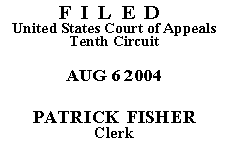

| DENNIS CARRILLO,
Plaintiff-Appellant, v. QWEST, Defendant-Appellee. |
|
On appeal, Mr. Carrillo asserts that the district court erred by (1) granting Qwest's motion to dismiss; (2) finding Qwest's motion to dismiss need not be converted into a motion for summary judgment, (3) finding Mr. Carrillo's Fed. R. Civ. P. 56(f) affidavit could not be considered under Fed. R. Civ. P. 12(b)(6); (4) denying his Fed. R. Civ. P. 59(e) / Fed. R. Civ. P. 15(a) motion; and (5) denying his motion for leave to interview and depose a witness. Mr. Carrillo also asserts for the first time on appeal that he was denied due process of law, but he fails "to articulate a reason for us to depart from the general rule that a federal appellate court does not consider an issue not passed upon below." Walker v. Mather (In re Walker), 959 F.2d 894, 896 (10th Cir. 1992) (quotation omitted). We therefore decline to consider his due process argument. See id. We likewise decline to consider the arguments he sought to raise in his proposed first amended complaint, that he here reasserts. Mr. Carrillo failed to meet the standard for granting a Rule 59(e) motion, a prerequisite to considering his proposed first amended complaint, and the district court therefore properly rejected it.
Our jurisdiction arises under 28 U.S.C. § 1291. Because "the sufficiency of a complaint is a question of law, we review de novo the district court's grant of a motion to dismiss pursuant to 12(b)(6), applying the same standards as the district court." Sutton v. Utah State Sch. for Deaf & Blind, 173 F.3d 1226, 1236 (10th Cir. 1999) (citation and quotation omitted). We review for abuse of discretion a Rule 59(e) motion. Computerized Thermal Imaging, Inc. v. Bloomberg, L.P., 312 F.3d 1292, 1296 n.3 (10th Cir. 2002).
Having examined the briefs, the record, and the applicable law pursuant to the above-mentioned standards, we conclude that Mr. Carrillo has not raised a reversible error in this case. We therefore AFFIRM the district court's judgment granting Qwest's motion to dismiss for the reasons stated in its May 27, 2003, memorandum opinion and order, and AFFIRM its August 12, 2003, memorandum opinion and order denying Mr. Carrillo's post-judgment motions. See Aplt. App. at 106-12 & 164-66.
Entered for the Court
Circuit Judge
*. After examining the briefs and appellate record, this panel has determined unanimously that oral argument would not materially assist the determination of this appeal. See Fed. R. App. P. 34(a)(2); 10th Cir. R. 34.1(G). The case is therefore ordered submitted without oral argument. This order and judgment is not binding precedent, except under the doctrines of law of the case, res judicata, and collateral estoppel. The court generally disfavors the citation of orders and judgments; nevertheless, an order and judgment may be cited under the terms and conditions of 10th Cir. R. 36.3.
2. The Honorable John L. Kane, Senior District Judge, United States District Court for the District of Colorado, sitting by designation.